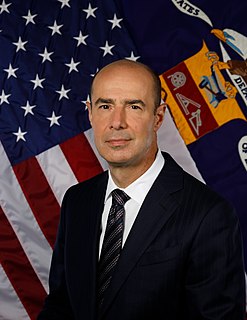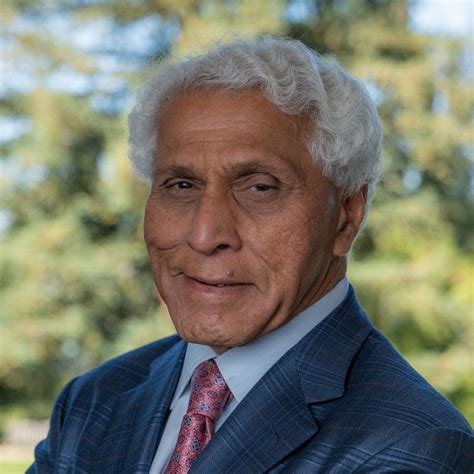Top 831 Funds Quotes & Sayings
Explore popular Funds quotes.
Last updated on December 21, 2024.
Throughout the universe of public and private funds, managers are measured quarterly against one index or another, defined by statistics, and corralled into this category or that category so that fund of funds, pensions, and other institutions can make comforting - if not necessarily prudent - asset allocation decisions.
Get-rich-quick thinking leads to three basic errors: (1) Getting involved with things you cannot understand; (2) Risking funds you cannot afford to lose, that is, borrowed funds; and (3) Making hasty decisions. Each of these actions violates one or more biblical principles... Together they constitute a sin called greed.
Millions of mutual-fund investors sleep well at night, serene in the belief that superior outcomes result from pooling funds with like-minded investors and engaging high-quality investment managers to provide professional insight. The conventional wisdom ends up hopelessly unwise, as evidence shows an overwhelming rate of failure by mutual funds to deliver on promises.
In Germany there is ranking for contribution rate, so the cheaper sickness funds with good quality can both advertise their better quality plus their lower contribution rates and therefore be gaining members. We had about 240 sickness funds a couple of months ago; we are now down to 213, I think. In two or three years, only 50 or so will survive.
While it is probably a poor idea to own actively managed funds in general, it is truly a terrible idea to own them in taxable accounts... taxes are a drag on performance of up to 4 percentage points each year... many index funds allow your capital gains to grow largely undisturbed until you sell... For the taxable investor, indexing means never having to say you're sorry.
The rate of growth of the relevant population is much greater than the rate of growth in funds, though funds have gone up very nicely. But we have been producing students at a rapid rate; they're competing for funds and therefore they're more frustrated. I think there's a certain sense of weariness in the intellectual realm, it's not in any way peculiar to economics, it's a general proposition.
Invest in low-turnover, passively managed index funds... and stay away from profit-driven investment management organizations... The mutual fund industry is a colossal failure... resulting from its systematic exploitation of individual investors... as funds extract enormous sums from investors in exchange for providing a shocking disservice... Excessive management fees take their toll, and manager profits dominate fiduciary responsibility.
... skepticism about past returns is crucial. The truth is, much as you may wish you could know which funds will be hot, you can't - and neither can the legions of advisers and publications that claim they can. That's why building a portfolio around index funds isn't really settling for average. It's just refusing to believe in magic.
There is the general belief that the corporation income tax is a tax on the "rich" and on the "fat cats." But with pension funds owning 30% of American large business-and soon to own 50%-the corporation income tax, in effect, eases the load on those in top income brackets and penalizes the beneficiaries of pension funds.
University presidents should be loud and forceful in defending the university as a social good, essential to the democratic culture and economy of a nation. They should be criticizing the prioritizing of funds for military and prison expenditures over funds for higher education. And this argument should be made as a defense of education, as a crucial public good, and it should be taken seriously. But they aren't making these arguments.
The fund scandals shined the spotlight on the fact that mutual fund managers were putting their interests ahead of the fund shareholders who trusted them, which had much more substantial consequences in the form of excessive fees and the promotion - as the market moved into the stratosphere - of technology funds and new economy funds which were soon to collapse.
Even fans of actively managed funds often concede that most other investors would be better off in index funds. But buoyed by abundant self-confidence, these folks aren't about to give up on actively managed funds themselves. A tad delusional? I think so. Picking the best-performing funds is 'like trying to predict the dice before you roll them down the craps table,' says an investment adviser in Boca Raton, FL. 'I can't do it. The public can't do it.'
When I was 23, 24, I started covering hedge funds - a lot of this was luck - when no one else did. This was before hedge funds were the prettiest girl in school: this was pre-nose job and treadmill for hedge funds, when nobody talked to them - back then, it was just all about insurance companies and money managers.
We are seeing more managed money and, to an extent, institutional money entering the space. Anecdotally speaking, I know of many people who are working at hedge funds or other investment managers who are trading cryptocurrency personally, the question is, when do people start doing it with their firms and funds?
Mutual funds charge 2% per year and then brokers switch people between funds, costing another 3-4 percentage points. The poor guy in the general public is getting a terrible product from the professionals. I think it's disgusting. It's much better to be part of a system that delivers value to the people who buy the product. But if it makes money, we tend to do it in this country.
The same drugs are way cheaper in Germany than in America because, obviously, if all sickness funds negotiate with the drug companies for a single price, then the market power of the sickness funds is fully used. So therefore you would expect the prices to be lower for the drugs in Germany, and this is exactly what you see, at least for non-generic drugs.
In 1946, Oxford University in England was offered large funds to create a new Institute of Human Nutrition. The University refused the funds on the ground that the knowledge of human nutrition was essentially complete, and that the proposed institution would soon run out of meaningful research projects.

















































